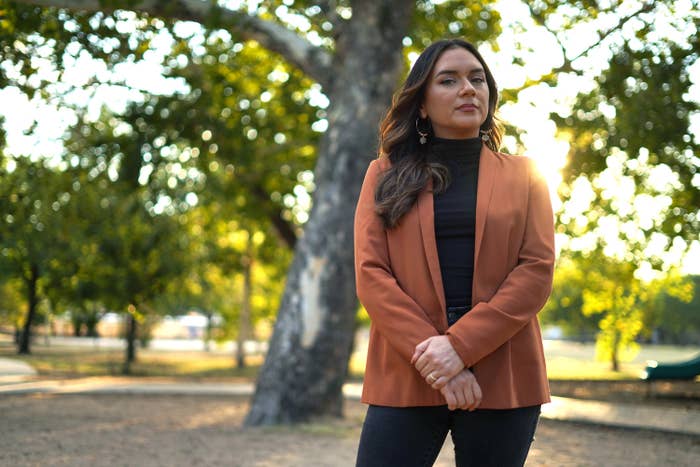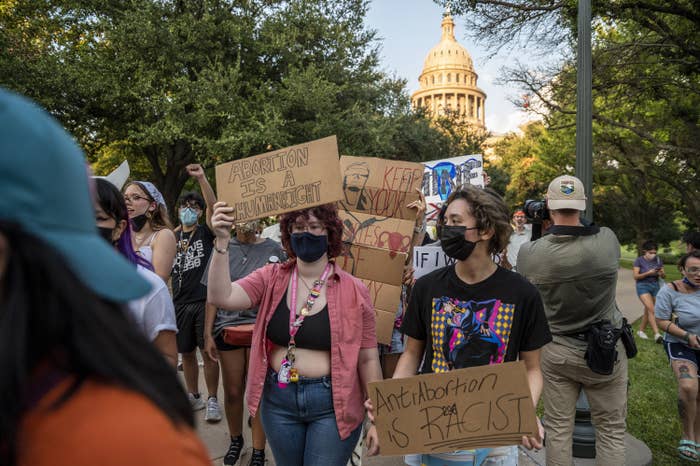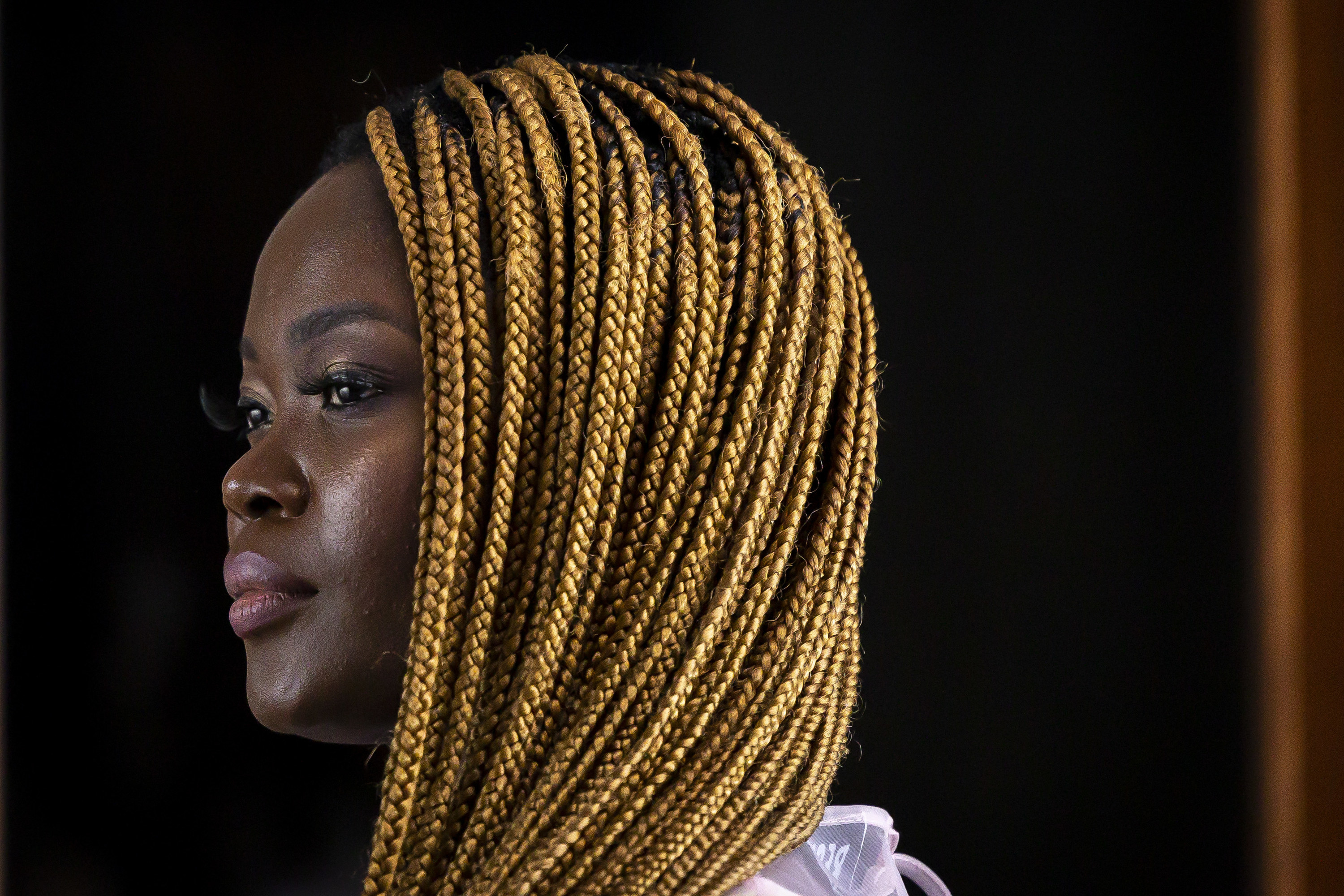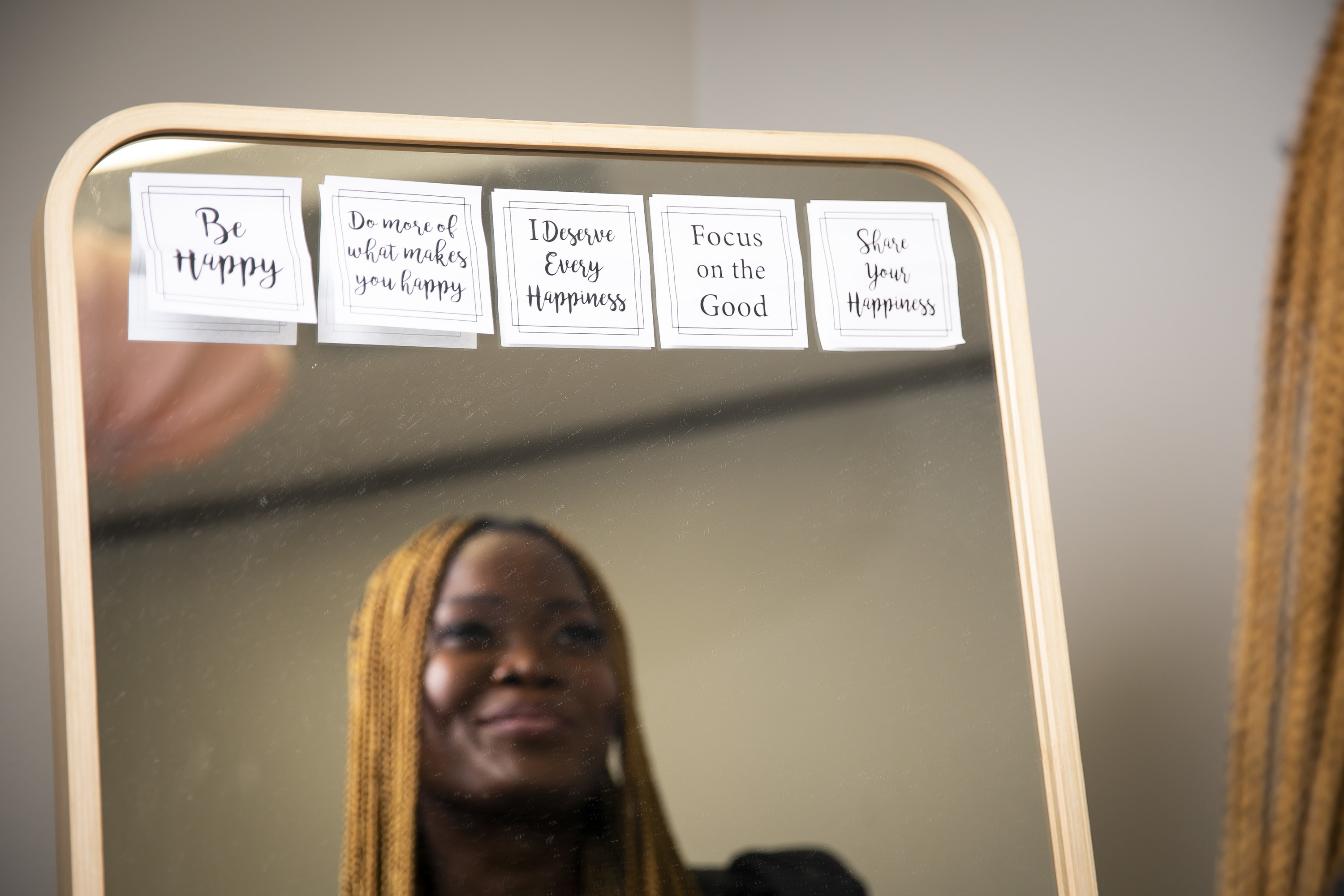
Growing up in a poor, immigrant family in Austin, Zoraima Pelaez couldn’t afford college right after high school. But after saving up as a hairstylist and makeup artist for several years, she enrolled in classes at the local community college with the goal of becoming the first in her family to get a degree.
Then she got pregnant.
Staring at the two little lines on her home test stick, she thought of her older sister, who had struggled as a young, single mother. Pelaez, who was in her early 20s, wasn’t ready to have a child. And she knew that in order to achieve her dream and graduate from college, she needed to get an abortion.
“I had other plans for myself and I wanted to see those through,” she said.
Now 33 and a third-year student at the University of Texas School of Law, Pelaez and thousands of others who’ve had abortions are urging the Supreme Court to uphold the precedent that protected their reproductive rights in an amicus brief filed Friday. The court is set to hear arguments in December regarding a Mississippi law that prohibits nearly all abortions after 15 weeks of pregnancy, before a fetus can survive outside the womb. At stake is the key tenet of reproductive rights in the US: that states cannot ban abortion before a fetus is viable. If the justices were to do away with that principle or allow exceptions to it, nationwide access to abortion care could crumble.
The brief, submitted by the nonprofits Advocates for Youth and We Testify, shares the abortion stories of about two dozen women, trans people, and nonbinary people, as well as one cis man whose partner terminated a pregnancy. Together, their experiences illustrate not only the diversity of those who access abortion care but also the wide array of reasons they choose not to stay pregnant. Some simply didn’t want to become parents, while others ended their pregnancies to protect their mental health, escape abusive relationships, or prioritize their education or career.
Including personal stories in court filings isn’t new. But according to Renee Bracey Sherman, founder and executive director of We Testify, there’s never been a brief with this many signatories of individuals who’ve had abortions. A total of 6,641 people who terminated their pregnancies as long ago as the mid-1940s and as recently as a couple of months ago joined the brief. Their names take up more than 60 pages of the document.
“I hope the justices read every single one of them,” said Bracey Sherman, who had an abortion at 19.
Her name appears in the brief in addition to her mother’s, an aunt’s, and three cousins’.
“We’re not random people,” Bracey Sherman said. “We are entire families of people, and abortion is part of what makes our families what they are.”
Though lower courts have repeatedly blocked the Mississippi law and others like it, the Supreme Court’s decision to revisit the issue in its next term, which starts in October, signaled that the justices may be willing not only to chip away at abortion rights but also potentially to dismantle Roe v. Wade, the landmark decision that made abortion legal nationwide almost 50 years ago. It’s the result of a yearslong effort by anti-abortion activists to get the issue back before the Supreme Court after Donald Trump won the presidency, and it will be the first major abortion case to come before the court since the conservative majority grew to 6–3 with the confirmation of Justice Amy Coney Barrett last year.
And after the justices refused to stop a six-week abortion ban from taking effect in Texas earlier this month, the fears have only grown that they could overturn the legal basis for the reproductive healthcare that hundreds of thousands of people rely on each year.
“I'm worried,” said Advocates for Youth President Debra Hauser, who had an abortion in 1995.
Still, Hauser said if the outpouring of support for the brief is any indicator, people who have had abortions, as well as others who believe that no one should be forced to carry a pregnancy to term, will continue to speak up and work to ensure everyone has access to safe, affordable reproductive care regardless of what the court does.
“People are paying attention now,” she said, noting that organizers didn’t expect to get thousands of signatures. The groups had just a week to collect signatories, and even though the filing has already been sent to the court, people are still submitting their names through the online petition.
“People are awake and aware,” Hauser said. “They're not going to go quietly and let this happen.”

In the upcoming case, Dobbs v. Jackson Women's Health Organization, the state of Mississippi is calling on the Supreme Court to overturn Roe and Planned Parenthood v. Casey, the 1992 opinion that held that states could not prohibit abortions before the viability point, which is usually around 24 weeks. Their attorneys argue in court filings that the Constitution does not protect the right to abortion, and the court’s requirement that state law not place an “undue burden” on abortion access before 24 weeks unfairly impedes states from creating local abortion regulations.
They also claim that societal changes and new scientific findings — such as the improved ability of women to “attain both professional success and a rich family life,” the wider accessibility of contraception and adoption, and the knowledge that a fetus has taken on the human form before viability — have essentially made abortion unnecessary.
“Innumerable women and mothers have reached the highest echelons of economic and social life independent of the right endorsed in those cases,” the state’s brief states. “Sweeping policy advances now promote women’s full pursuit of both career and family.”
Attorneys for Jackson Women’s Health, the only remaining abortion clinic in the state, shot down those arguments in its response filed last week, saying there were no developments that made the right to abortion “any less worthy of constitutional protection.” And the idea that advancements in gender equality have made abortion any less vital is “nonsensical,” the clinic’s attorneys said, noting that the ability of women to participate equally in society is predicated on their ability to make decisions about their reproductive health.
Individuals who are denied the right to an abortion face greater health risks associated with continued pregnancy and childbirth, lost educational opportunities, and economic insecurity, the attorneys said.
“Even if the claim that the United States had achieved full gender equality were true (it is not), those gains were made while the Court has steadfastly reaffirmed the right to abortion,” their brief states.
Though their reasons for getting abortions varied, eight individuals who shared their stories in the amicus brief or signed their names to the filing told BuzzFeed News that being able to terminate their pregnancy or pregnancies allowed them to live the lives that they wanted.
“I gave myself the gift of my future, is how I think about it,” said Meg Ringler, 32, of Pittsburgh. “I was able to create a life for myself that I love.”
When Advocates for Youth’s Hauser learned she was pregnant in 1995, her husband had disappeared. She ended her pregnancy so she could better take care of herself and the 6-month-old son she already had.
“I was able to make the best choice for my family at that time and, you know, I'm just forever grateful for it,” she said.
For Marketia Patterson, having the option to end two pregnancies when she learned that severe neural tube defects meant the fetuses were unlikely to live was critical for her mental health. She already had one child and wanted more. But if she had been forced to carry those pregnancies to term, only for both children to die, she said she likely would not have tried to have another baby again.
“There's something about knowing that the pregnancy you’re carrying is not viable,” said Patterson, 63, of Athens, Georgia, who gave birth to her second child after her abortions.
“I hate that I was ever put in that position by fate, Mother Nature, call it what you will,” she added. “But I'm glad I had that option.”
As she told her story in the brief, Pelaez wrote that her decision to have an abortion almost a decade ago made her into the person she is today. She eventually transferred from community college to the University of Texas at Austin, where she graduated with honors in 2017. When she finishes law school, she plans to use her legal education to fight for reproductive rights.
“Now I get to have my dream career and my amazing husband,” she told BuzzFeed News, adding that she’s looking forward to building a family with her partner on her own terms. “Abortion and the fact that I got one … is the throughline of my life.”

Others, like Tohan O., said abortion care saved their lives. In 2018, Tohan found out she was pregnant as she was trying to sever ties with an abusive partner. The 35-year-old Houston resident said that having an abortion was her only option to get away from her ex without any lasting ties.
“I don't even know if I would be here to tell the story if I didn't make that decision,” she said.
When Texas’s six-week ban became law, Tohan broke down in tears. Had this law been in effect when she needed an abortion, she would have been lost over how to end her pregnancy. Now she worries about how others will get care.
“I met a young girl who used a wire hanger to try to self-abort, and she ended up in a critical, life-threatening situation after,” Tohan said. “When you take people’s rights, you’re literally endangering their lives. If someone wants to have an abortion, they’re going to find a way to do it.”
She and others whose names are in the brief hope that by sharing their stories, the justices will see how personal the decision to have an abortion is and how vital it is to protect individuals’ rights to make that call for themselves.
“People don’t know what’s going on in other people’s lives,” Hauser said. “It’s really important for people to have the ability to have agency over their decisions and to have bodily autonomy. That's kind of at the very essence of freedom.”

